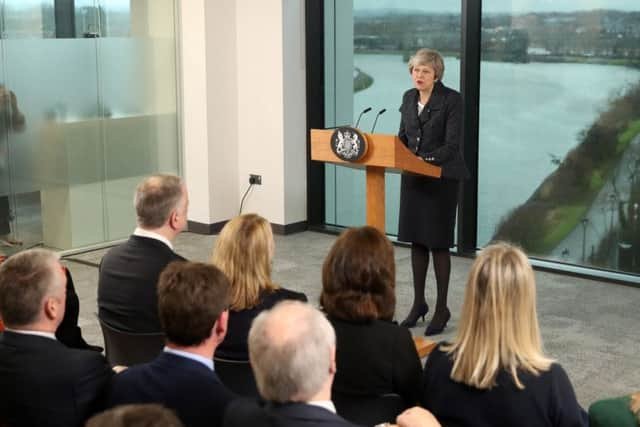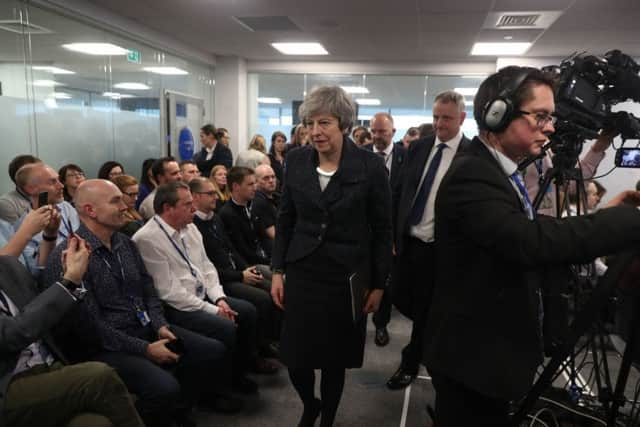Prime minister repeats her pledges to Northern Ireland but gives no clarity on Brexit
and live on Freeview channel 276
Theresa May gave a speech in Belfast to businesses and media at Allstate, in which she emphasised her pledges to avoid both a hard land border and a border in the Irish Sea.
But her words, which did not clarify the future of Brexit as it relates to the Province, drew a critical response from local anti-Brexit parties, and failed to draw a warm reaction from unionists.
Advertisement
Hide AdAdvertisement
Hide AdAnd she sidestepped questions, including one from the News Letter, about the moderate unionist critique of the backstop from Lords Trimble and Bew that it breaches the 1998 Belfast Agreement.


In her 20-minute address, Mrs May said: “Over the last two-and-a-half years, we have come a long way towards a solution that works for Northern Ireland and Ireland. We have agreed mutual protections for citizens’ rights, the maintenance of our common travel area, and set a framework for our future relationship that ensures tariff and quota-free trade and protects our close co-operation on security and law enforcement.”
But, she added,”the UK Parliament rejected the Withdrawal Agreement because of their concerns about the backstop”.
Mrs May said: “I know that many people in Northern Ireland, and indeed across this island, are worried about what Parliament’s rejection of the withdrawal deal means for them. So I am here today to affirm my commitment, and that of the United Kingdom government, to all of the people of Northern Ireland, of every background and tradition.”
Advertisement
Hide AdAdvertisement
Hide AdShe affirmed her commitment both to the “Belfast/Good Friday Agreement” and to “delivering a Brexit that ensures no return to a hard border between Northern Ireland and Ireland – which is unshakable.”


The prime minister was at pains to state “I was 12 when the Troubles began and 41 when the Belfast Agreement was reached; for all my adult life, Northern Ireland has been a central political issue”.
The decisive moment in the transformation away from conflict, she said, “was the Belfast Agreement in 1998”.
“It enshrined the principle that it is the ‘birthright of all the people of Northern Ireland to identify themselves and be accepted as Irish or British, or both, as they may so choose.
Advertisement
Hide AdAdvertisement
Hide Ad“And it enshrined the consent principle: that it will always and only be for the people of Northern Ireland to decide what their constitutional future should be.”
She said: “A fundamental belief in the Union of Great Britain and Northern Ireland is part of my political heritage as a Conservative and unionist – and that will never change.
“But the unionism I believe in is one that respects absolutely the central importance of Irish identity to those people in Northern Ireland who claim it.
“Because the Belfast Agreement is not just the bedrock of stability here in Northern Ireland, its principles are fundamental to the security and success of the whole United Kingdom.
Advertisement
Hide AdAdvertisement
Hide Ad“Our absolute commitment to those principles has informed and directed my approach to Brexit – from my first speeches as prime minister to my first meetings with the taoiseach.
“And in December 2017, in the Joint Report we agreed with the EU, we committed to protect the 1998 agreement ‘in all its parts’.”
She added: “Our preferred approach has always been to deliver them through the Future Relationship. But I accepted the need for an insurance policy or bridging arrangement to guarantee no hard border if the Future Relationship was not in place in time.”
“That is why I agreed to the backstop in the Withdrawal Agreement. And unlike the original European Commission proposal, it did not impose a customs border between Northern Ireland and the rest of the UK.
Advertisement
Hide AdAdvertisement
Hide Ad“Many people, businesses, farming organisations and voluntary groups in Northern Ireland agreed with me. They spoke out in support of the Withdrawal Agreement and they defended the backstop.”
The prime minister said in her speech that she had fought hard for the Withdrawal Agreement “as it stands”.
Theresa May said: “I believed it could command a majority in the House of Commons. But I have had to face up to the fact that in its current form it cannot. And the need for changes to the backstop is the key issue.
“While there were those in Northern Ireland who spoke in favour of it, it is also true that the backstop is not supported by the two main unionist parties here. And this also influenced MPs in England, Scotland and Wales in voting against the deal.
Advertisement
Hide AdAdvertisement
Hide Ad“I can only deliver on the commitments we have made if I can get a deal through the UK Parliament. And meetings with MPs across the House showed that I can only get a deal through Parliament if legal changes are made to the backstop.”
She acknowledged that changing the backstop “creates real anxieties here in Northern Ireland and in Ireland” and added: “I recognise, too, that the majority of voters in Northern Ireland voted to remain.”
The prime minister said: “First, we stand by our commitment in the Joint Report that there will be no hard border, including any physical infrastructure or related checks and controls. And this means people on either side of that border will be able to live their lives as they do now.”
She added: “So while I have said that technology could play a part, and that we will look at alternative arrangements, these must be ones that can be made to work for the particular circumstances of Northern Ireland.
Advertisement
Hide AdAdvertisement
Hide Ad“Second, neither will I compromise on my promise to protect Northern Ireland’s integral place in the UK.
“When the European Commission proposed a version of the backstop which involved creating a customs border in the Irish Sea, I successfully resisted it. And I have ruled out any return to such a suggestion.” It would, she said, “damage the integrity of the UK’s internal market”.
She added that “there will be no new regulatory barriers between Northern Ireland and the rest of the UK without Northern Ireland’s institutions having their say”.
Mrs May said: “Third, there will be full protection for all existing cross-border co-operation.”
Advertisement
Hide AdAdvertisement
Hide AdThe prime minister then spoke about nationalist concerns, saying: “The birth right to identify and be accepted as British, Irish or both, and to hold both British and Irish citizenship is absolutely central to the agreement.
“But I know that in some cases recently, people have encountered difficulties in securing their rights as Irish citizens to bring in family members.”
The prime minister said she had asked the home secretary, working with Northern Ireland secretary, “to review these issues urgently”.
Mrs May said “Without a devolved government – and with only unionists represented in the House of Commons – it is more important than ever that we uphold our duty to ensure all voices in Northern Ireland are heard.”
Advertisement
Hide AdAdvertisement
Hide Ad“... So [on Wednesday] I will be sitting down with the political parties to discuss the way forward and ensure that we can deliver for all the people of Northern Ireland.”
Mrs May said: “I have said many times that I want to see a new, deep and special partnership between the UK and the 27 member states of the European Union.
“But our relationship with Ireland is deeper than our relationship with any of the other 27.”
Setting out existing Anglo-Irish ties, she added: “We already have the British Irish Intergovernmental Conference, and regular summits between UK and Irish politicians.
Advertisement
Hide AdAdvertisement
Hide Ad“But as we leave the European Union, we will need to establish new ways of coming together to develop further our unique relationship.
“For example, the Irish government has suggested annual meetings where the prime minister and taoiseach, together with senior ministerial colleagues, come together to discuss the big issues of the day.”
She said that “both the UK and the Irish governments have already made clear that we would support the tantalising possibility of a joint UK and Ireland World Cup bid for 2030, should our respective football associations choose to pursue this”.
She said that as the government seeks a deal that secures a majority in the Westminster Parliament, “which is the best way to deliver for the people of Northern Ireland”, she also hopes “we can ... move towards the restoration of devolution – so that politicians in Northern Ireland can get back to work on the issues that matter to the people they represent”.
Advertisement
Hide AdAdvertisement
Hide AdShe said: “It must be how, together, we move forwards to shape the opportunities of the future.”
• Morning View: PM devoted to NI but focuses on land border